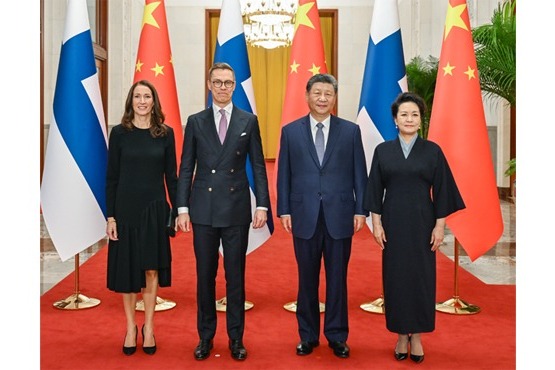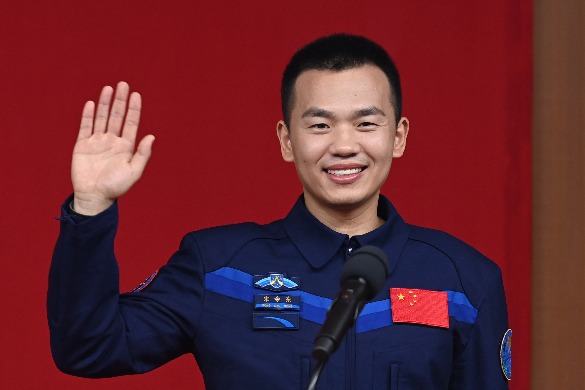Strategy set to accelerate self-reliance

President Xi has called for keeping science, tech lifeline 'in our own hands'
China's latest call to implement the innovation-driven development strategy will accelerate efforts to pursue breakthroughs in crucial technologies and safeguard the stability of global industrial and supply chains, amid the rising tide of technological protectionism in some countries, according to experts and company executives.
China is a strong supporter of globalization, but the professional division of labor in the world is facing risks as some countries attempt to hinder cooperation in high-tech sectors, said Shi Hongxiu, a professor of economics at the National Academy of Governance.
In such a context, China has no choice but to boost self-reliance in crucial technologies, Shi said, adding that President Xi Jinping's call to implement the strategy is of great significance to encourage Chinese scientists, entrepreneurs and others to double down on pursuing indigenous innovation in pursuing the country's high-quality development.
During a recent inspection tour of Wuhan, the capital of Hubei province, Xi emphasized the importance of implementing the innovation-driven development strategy to "keep the lifeline of science and technology firmly in our own hands".
Xi, who is also general secretary of the Communist Party of China Central Committee and chairman of the Central Military Commission, urged greater progress in independence and self-reliance in the sector of science and technology, to make the country's development more secure. He also stressed the need to foster more advanced technologies and sectors and create new advantages in international competition.
Xi said that with the country's continuing development, it is urgent to make breakthroughs in core technologies in key fields.
Wang Yiming, vice-chairman of the China Center for International Economic Exchanges, said global competition in strategically important industries has intensified, and some countries have adopted an approach of being a "small courtyard with high walls" against China, aiming to contain its high-tech sectors.
"Now, pursuing self-reliance in core technologies is not a matter of development, but a matter of survival," Wang said, adding that self-reliance is a prerequisite to guarantee national security.
"For a big country, self-reliance in key technologies is crucial to make China really strong. Innovation is the decisive factor in building a powerful modern socialist country," Wang said.
In an article published recently in People's Daily, He Lifeng, head of the National Development and Reform Commission, wrote that Xi Jinping Thought on Socialist Economy with Chinese Characteristics for a New Era makes it clear that innovation-driven development is the primary driving force for China's economic development.
"We must adhere to the core position of innovation in China's modernization drive, promote high-level self-reliance in science and technology, and accelerate efforts to build China into an important talent center and high-level innovation hub for the world," He said.
The senior official said that more efforts will be made to beef up the nation's strategic scientific and technological strength, and focus on solving bottlenecks in core technologies.
Bai Ming, deputy director of international market research at the Chinese Academy of International Trade and Economic Cooperation, said that resolving to achieve breakthroughs in key technologies is a crucial part of the innovation-driven development strategy.
Since the start of reform and opening-up more than 40 years ago, China has learned a lot from foreign advanced technologies, but such a development mode also left weak areas in China's industrial foundation, making it heavily reliant on others for core technologies such as high-end chips, aircraft engines, core robotic components and premium medical equipment, Bai said.
There is an urgent need to catch up in these areas, said experts, highlighting that progress is underway. For instance, 19 of the world's 20 fastest-growing chip industry companies over the past four quarters, on average, are in China, according to data compiled by Bloomberg, compared with just eight at the same time last year.
Meanwhile, for the first time, three Chinese mainland chipmakers accounted for more than 10 percent of global foundry revenue in the first quarter of this year, according to a report from Trend-Force, a Taiwan-based market research and intelligence provider. Foundry is the industry term for contract chipmaking.
In the global ranking of its national innovation index, China climbed to 12th in 2021, up from 34th in 2012, topping middle-income economies, according to the World Intellectual Property Organization.
Wu Hequan, an academician at the Chinese Academy of Engineering, said that promoting innovation-driven development will encourage industries to embrace technological transformation, which will fuel the high-quality development of China's economy.
A typical example is the rapid evolution of China's new energy vehicle industry. The nation's carmakers traditionally fell behind their international rivals in gasoline automobiles, but a strong desire to innovate and experiment with new technologies helped them quickly embrace electric vehicles.
Of the 15 most popular new energy vehicle carmakers from January to May in China, 12 were Chinese brands, and the three international brands ranked third, 14th and 15th, with a combined market share of only 10.4 percent, according to data from the China Passenger Car Association.
Cui Dongshu, the association's secretary-general, said that China "has gained the first-mover advantage in terms of electrification. We should speed up technological innovation to further sharpen our competitive edge and thus make a greater contribution to the global energy transition."
Yu Kai, CEO of Horizon Robotics, the first Chinese company to commercialize self-designed processors for autonomous driving, said smart electric vehicles are a once-in-a-lifetime opportunity for China to develop homegrown artificial intelligence chips and operating systems.
"China is now the world's most vibrant market for smart electric vehicles, and the most competitive arena for global tech companies that target intelligent driving," Yu said. "We believe China will also become a major source of innovation for the industry."
- China's transportation capabilities are breaking new grounds
- Squirmy crop harvested in waters off Fujian
- Harbin celebrates 100-day countdown to 9th Asian Winter Games
- China turns out its self-developed tunnel boring machine with biggest diameter
- Alshaa League takes tourism to new heights with low-altitude adventure
- Over 7,000 migratory birds gather at Jilin nature reserve





































